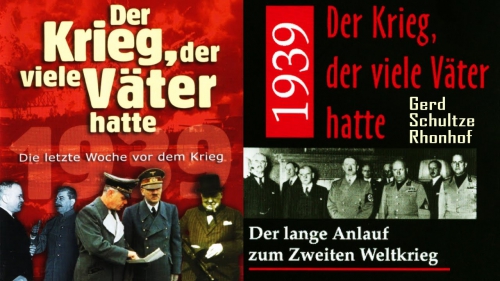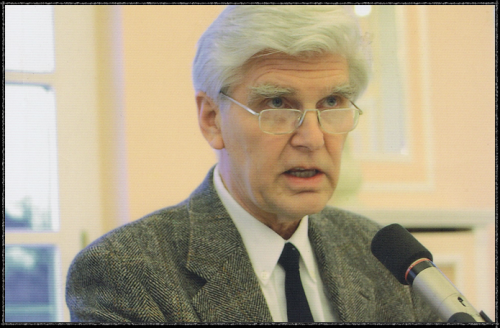I have in the past written much about the Second World War, from Pearl Harbor to the dropping of the bombs on Hiroshima and Nagasaki; from Roosevelt’s manipulations to get the US into the war to the forced migrations of millions of Germans and other Europeans after the war. While much of this was based on work from revisionist historians (even Herbert Hoover!), most of the authors on which my posts were based were from the United States or otherwise affiliated with the victorious side.
I am now beginning to go through another history of the war, this one by a German revisionist historian. The book is entitled “1939 – The War That Had Many Fathers,” by Gerd Schultze-Rhonhof.
Schultze-Rhonhof was born in Weimar. He entered military service in 1959 a few years after the Bundeswehr was founded. When he retired in 1996, he was Territorial Commander-in-chief in charge of Lower Saxony and Bremen and held the rank of Generalmajor (Major General).
The book is quite controversial, even (or especially) in Germany:
In his book “Der Krieg, der viele Väter hatte” [The War that had many Fathers], he argues that Adolf Hitler had not wanted to risk war right until September 1939. Thus, Schultze-Rhonhof especially blames Poland for the outbreak of World War II as a result the rejection of German willingness of negotiations. Besides, also Great Britain, France, the United States and the Soviet Union had taken their part in the outbreak of the war because they had driven Poland into the war.
It should be noted that the author does not seem to be introducing a book that exonerates Hitler. He suggests that the war had many fathers – not just one. This is certainly an uncontroversial suggestion to anyone with even a moderate understanding of the roots of the war.
From my past reading, it is quite clear that the US, Great Britain, and France did, in fact, push Poland into war and did cause Poland to not negotiate with Hitler and Germany, for example from “Freedom Betrayed,” by Herbert Hoover:
Further American activities were disclosed after the Germans had invaded Poland in September 1939 and seized the Polish Foreign Office records. The Germans released a mass of documents which certainly indicated that the American Ambassador to France, William C. Bullitt, who could only act on Mr. Roosevelt’s authority, had made a profusion of oral assurances to officials of Poland and France which they could only interpret as a promise of assistance of some kind of force from the United States.
Hoover documents his conversations with US Ambassador to Britain, Joseph Kennedy, during the run-up to the war. Hoover met with Kennedy in May, 1945. According to Kennedy:
…Roosevelt and Bullitt were the major factors in the British making their guarantees to Poland and becoming involved in the war. Kennedy said that Bullitt, under instructions from Roosevelt, was constantly urging the Poles not to make terms with the Germans and that he Kennedy, under instructions from Roosevelt, was constantly urging the British to make guarantees to the Poles.
He said that after Chamberlain had given these guarantees, Chamberlain told him (Kennedy) that he hoped the Americans and the Jews would now be satisfied but that he (Chamberlain) felt that he had signed the doom of civilization.
Kennedy said that if it had not been for Roosevelt the British would not have made this most gigantic blunder in history.
Further from the Polish Ambassador Potocki to the Polish Foreign Office, dated two months before the British guarantee to Poland, in which he summarizes his conversations with U.S. Ambassador Bullitt:
…2) the war preparations of the United States on land, sea, and air, which will proceed in an accelerated tempo and will cost the colossal sum of $1,250,000,000. 3) the definite opinion of the President that France and Britain should abandon all policy of compromise with the totalitarian countries and should not enter into any discussion with them which might be directed towards any territorial changes. 4) a moral assurance that the United States is abandoning the policy of isolation and is ready, in case of war, to participate actively on the side of Great Britain and France, placing all its resources, financial and in raw materials, at their disposal.
So I find no reason on this basis to take exception with Schultze-Ronhof.
Others apparently criticize the author for ignoring certain other well-known sources, for example:
Well-known sources revealing Hitler’s will to war (for instance the Halder War Diary) are ignored or doubted.
Overall, the response to the author’s work was not favorable:
Schultze-Rhonhofs writings on the origins of World War II have not been accepted as accurate by professional historians. His claim that Hitler had been against a war with Poland goes against the conventional opinion in historical research and academic teaching. Schultze-Rhonhofs book has been reviewed by important German newspapers as Die Welt and Frankfurter Allgemeine Zeitung. Both articles assessed it as “myth-creating” and “abstruse”.
In other words, a good candidate for a revisionist view of the war from the German perspective! As with every historical work – mainstream or revisionist – there are certain to be gems of truth to be discovered. Just as I have found items of significant note in books generally acceptable to the mainstream – despite my cynical bent – I expect there will be worthwhile tidbits buried within this book.
I will begin with two, both found in the preface written by the author. First, the author suggests that the victors of the Second World War imposed on Germany the requirement that documents be made consistent with, and in the future all official versions of the history of the war align with the official, desired version as told by the victorious powers:
It was baffling for me to find in the German literature that the early historiography after the war was obviously drawn up under the effect of legal requirements which gave to German research a quite definite direction. In the Transition Treaty (Überleitungsvertrag) of 1954, Article 7 (1), it is bindingly laid down that “all judgments (Urteile) from the Nuremberg Trials “remain valid and effective in every regard according to German law and are to be treated accordingly by German courts and authorities.” Included, as an integral part, in the text of the judgments of the main Nuremberg Trial of 1946 is an exactly 200 pages long account of the German war and pre-war history from the perspective of the Soviets, the Americans, the British and the French….this account of “German history” from the victors’ perspective was recognized by the (German) Federal Government as “in all respects valid and effective” (rechtswirksam und rechtskräftig) and thus binding for German courts and authorities. (Pages 12-13)
I find nothing terribly shocking in this claim. Victorious governments have chosen to ensure that history is written as they want it to be written. They do so in their own countries – why not do so in the defeated nations as well? Allied leaders made such statements regularly in any case, stating that the Germans, blamed for causing both major wars, must be cleansed of their lust for war. Where better to start than with the history?
Certainly, and understandably, the Allies implemented a policy of denazification. It also seems that they went further (from Wikipedia):
After World War II, the Allied powers (Soviet Union, France, Britain, and the USA) ensured that Nazi ideology was eliminated from the curriculum. They installed educational systems in their respective occupation zones that reflected their own ideas.
The author states something similar:
Included among these authorities [bound to respect German history from the victors’ perspective] are the regional ministers of culture who examine and authorize the contents of the school history textbooks.
The effect of this treaty is still in force. The author describes that the Transition Treaty was replaced in 1990 by a new Two-Plus-Four Treaty, with this entire clause inserted intact. (Page 13) This treaty allowed for the reunification of East and West Germany:
The Treaty on the Final Settlement With Respect to Germany, German: Vertrag über die abschließende Regelung in bezug auf Deutschland (or the Two Plus Four Agreement, German: Zwei-plus-Vier-Vertrag; short: German Treaty) was negotiated in 1990 between the Federal Republic of Germany and the German Democratic Republic (the titular “Two”), and the Four Powers which occupied Germany at the end of World War II in Europe: France, the Soviet Union, the United Kingdom, and the United States of America. In the treaty the Four Powers renounced all rights they held in Germany, allowing a united Germany to become fully sovereign the following year.
While all rights might have been renounced, many conditions were included in the treaty, including conditions regarding the size and scope of the German military, for example.
The second interesting bit of information I found in the preface regards the first threats of war between Poland and Germany. The author claims that it was Poland that first made threats regarding the port city of Danzig:
It was pronounced in March 1939 by the Polish Ambassador in Berlin, even before Hitler gave the command to the Wehrmacht’s High Command to prepare for war against Poland. (Page 12)
This is an interesting point. To my recollection, nothing is directly mentioned of this in Hoover’s book, although a hint might be found in the warning from Beck to von Moltke:
[Hitler] now turned his attention to Poland. On March 21, 1939, less than a week after his armies had rolled into Prague, he made a demand upon Poland for the annexation of Danzig, the return of other Germans in Polish territory, and restrictions of the Polish Corridor to the Baltic.
On March 25, the Polish Government replied, denying Hitler’s claims and refusing any consequential concessions. Three days later, Foreign Minister Beck of Poland warned H. A. von Moltke, the German Ambassador in Warsaw, against any German action involving Danzig. (Page 128)
From Patrick Buchanan’s book, “Churchill, Hitler, and the Unnecessary War,” is a further clue – perhaps a somewhat corroborating bit of evidence. As an aside, Buchanan describes the guarantee to Poland as a “fatal blunder,” “the most fateful British declaration of the twentieth century.”
Buchanan writes of a secret directive from Hitler:
… [On] March 25, Hitler had issued a secret directive to his army commander in chief: “The Feuhrer does not wish to solve the Danzig question by force. He does not wish to drive Poland into the arms of Britain by this.” Hitler did not want war with Poland, he wanted an alliance with Poland. (Page 254)
Buchanan attributes this quote to a book by Simon Newman, “March 1939: The British Guarantee to Poland,” page 184.
From “Perpetual War for Perpetual Peace,” Edited By Harry Elmer Barnes
In this new and exalted mood Chamberlain moved rapidly in the direction of a momentous pledge to Poland. In March, 1939, Hitler was exerting strong pressure upon Poland in favor of concessions which seemed quite reasonable. He wished to incorporate Danzig within the Reich (after confirming Polish economic privileges in the city) and desired permission to construct an extra-territorial motor road across the Corridor. In 1933 President Roosevelt had spoken of the possibility of a German elevated railway across the Corridor. But, in 1939, the Polish Foreign Minister refused to grant these concessions, and war clouds gathered along the Polish horizon.
Following the German and Soviet invasion, no help from Britain or France materialized:
Poland was betrayed by both Britain and France and her own statesmen were too stupid to understand the simplest lessons in Realpolitik.
So, perhaps, there is some truth in the claim by Schultze-Rhonhof.
I will continue to write on this book. From my reading so far, there are several topics worth further exploration.
Reprinted with permission from Bionic Mosquito.



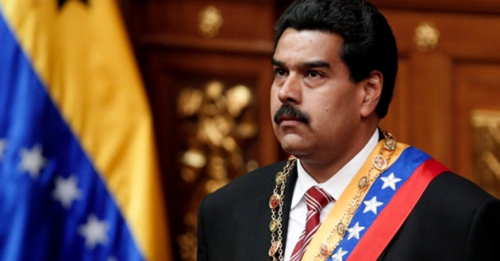
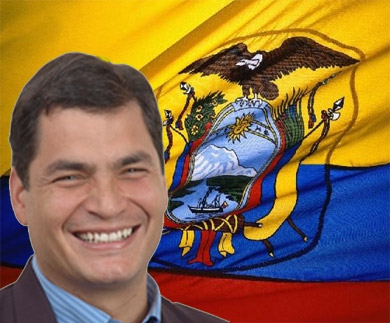 Le 1er mars, depuis Montevideo, où il assistait à l’investiture du président uruguayen Tabaré Vasquez, le président Correa a déclaré : «Le Venezuela est confronté à une guerre économique et médiatique, et se retrouve dans la situation d’autres gouvernements progressistes d’Amérique latine, avant lui. Cette situation, on l’a déjà vécu en Amérique latine. Souvenons-nous de ce qui est arrivé à (Salvador) Allende : la même guerre économique, le même type d’ingérence, les mêmes attaques médiatiques. De grâce, tirons les leçons de l’Histoire ». Selon Correa, cette ingérence « ne débouchera pas forcément sur ce qui est arrivé à Allende. Il n’en demeure pas moins que nous sommes confrontés chaque jour aux tentatives de déstabilisation de gouvernements démocratiques et progressistes d’Amérique latine, par la guerre économique, et à la manipulation mondiale en matière d’information ».
Le 1er mars, depuis Montevideo, où il assistait à l’investiture du président uruguayen Tabaré Vasquez, le président Correa a déclaré : «Le Venezuela est confronté à une guerre économique et médiatique, et se retrouve dans la situation d’autres gouvernements progressistes d’Amérique latine, avant lui. Cette situation, on l’a déjà vécu en Amérique latine. Souvenons-nous de ce qui est arrivé à (Salvador) Allende : la même guerre économique, le même type d’ingérence, les mêmes attaques médiatiques. De grâce, tirons les leçons de l’Histoire ». Selon Correa, cette ingérence « ne débouchera pas forcément sur ce qui est arrivé à Allende. Il n’en demeure pas moins que nous sommes confrontés chaque jour aux tentatives de déstabilisation de gouvernements démocratiques et progressistes d’Amérique latine, par la guerre économique, et à la manipulation mondiale en matière d’information ».
 del.icio.us
del.icio.us
 Digg
Digg





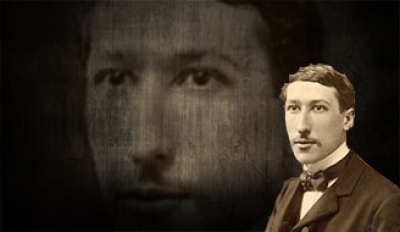 Le penseur français René Guénon (1886 – 1957) ne suscite que très rarement l’intérêt de l’université hexagonale. On doit par conséquent se réjouir de la sortie de René Guénon. Une politique de l’esprit par David Bisson. À l’origine travail universitaire, cet ouvrage a été entièrement retravaillé par l’auteur pour des raisons d’attraction éditoriale évidente. C’est une belle réussite aidée par une prose limpide et captivante.
Le penseur français René Guénon (1886 – 1957) ne suscite que très rarement l’intérêt de l’université hexagonale. On doit par conséquent se réjouir de la sortie de René Guénon. Une politique de l’esprit par David Bisson. À l’origine travail universitaire, cet ouvrage a été entièrement retravaillé par l’auteur pour des raisons d’attraction éditoriale évidente. C’est une belle réussite aidée par une prose limpide et captivante.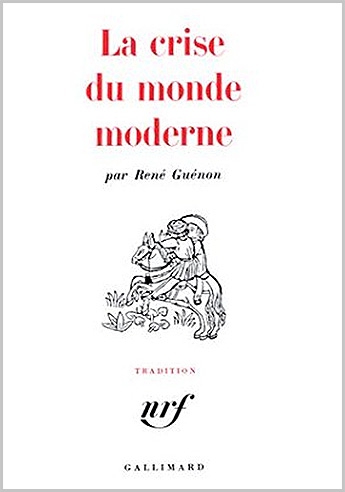 Au cours de l’Entre-deux-guerres, le futur historien des religions affine sa propre vision du monde. Alimentant sa réflexion d’une immense curiosité pluridisciplinaire, il a lu – impressionné – les écrits de Guénon. D’abord rétif à tout militantisme politique, Eliade se résout sous la pression de ses amis et de son épouse à participer au mouvement politico-mystique de Corneliu Codreanu. Il y devient alors une des principales figures intellectuelles et y rencontre un nommé Cioran. Au sein de cet ordre politico-mystique, Eliade propose un « nationalisme archaïque (p. 252) » qui assigne à la Roumanie une vocation exceptionnelle. Son engagement dans la Garde de Fer ne l’empêche pas de mener une carrière de diplomate qui se déroule en Grande-Bretagne, au Portugal et en Allemagne. Son attrait pour les « mentalités primitives » et les sociétés traditionnelles pendant la Seconde Guerre mondiale s’accroît si bien qu’exilé en France après 1945, il jette les premières bases de l’histoire des religions qui le feront bientôt devenir l’universitaire célèbre de Chicago. Si Eliade s’éloigne de Guénon et ne le cite jamais, David Bisson signale cependant qu’il lui expédie ses premiers ouvrages. En retour, ils font l’objet de comptes-rendus précis. Bisson peint finalement le portrait d’un Mircea Eliade louvoyant, désireux de faire connaître et de pérenniser son œuvre.
Au cours de l’Entre-deux-guerres, le futur historien des religions affine sa propre vision du monde. Alimentant sa réflexion d’une immense curiosité pluridisciplinaire, il a lu – impressionné – les écrits de Guénon. D’abord rétif à tout militantisme politique, Eliade se résout sous la pression de ses amis et de son épouse à participer au mouvement politico-mystique de Corneliu Codreanu. Il y devient alors une des principales figures intellectuelles et y rencontre un nommé Cioran. Au sein de cet ordre politico-mystique, Eliade propose un « nationalisme archaïque (p. 252) » qui assigne à la Roumanie une vocation exceptionnelle. Son engagement dans la Garde de Fer ne l’empêche pas de mener une carrière de diplomate qui se déroule en Grande-Bretagne, au Portugal et en Allemagne. Son attrait pour les « mentalités primitives » et les sociétés traditionnelles pendant la Seconde Guerre mondiale s’accroît si bien qu’exilé en France après 1945, il jette les premières bases de l’histoire des religions qui le feront bientôt devenir l’universitaire célèbre de Chicago. Si Eliade s’éloigne de Guénon et ne le cite jamais, David Bisson signale cependant qu’il lui expédie ses premiers ouvrages. En retour, ils font l’objet de comptes-rendus précis. Bisson peint finalement le portrait d’un Mircea Eliade louvoyant, désireux de faire connaître et de pérenniser son œuvre.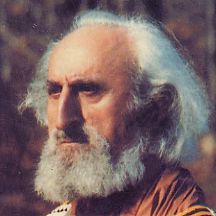 En étroite correspondance épistolaire avec Guénon, Schuon devient son « fils spirituel ». cela lui permet de recruter de nouveaux membres pour sa confrérie soufie qu’il développe en Europe. D’abord favorable à son islamisation, Schuon devient ensuite plus nuancé, « la forme islamique ne contrevenant, en aucune manière, à la dimension chrétienne de l’Europe. Il essaiera même de fondre les deux perspectives dans une approche universaliste dont l’ésotérisme sera le vecteur (p. 172) ». Cette démarche syncrétiste s’appuie dès l’origine sur son nom musulman signifiant « Jésus, Lumière de la Tradition».
En étroite correspondance épistolaire avec Guénon, Schuon devient son « fils spirituel ». cela lui permet de recruter de nouveaux membres pour sa confrérie soufie qu’il développe en Europe. D’abord favorable à son islamisation, Schuon devient ensuite plus nuancé, « la forme islamique ne contrevenant, en aucune manière, à la dimension chrétienne de l’Europe. Il essaiera même de fondre les deux perspectives dans une approche universaliste dont l’ésotérisme sera le vecteur (p. 172) ». Cette démarche syncrétiste s’appuie dès l’origine sur son nom musulman signifiant « Jésus, Lumière de la Tradition».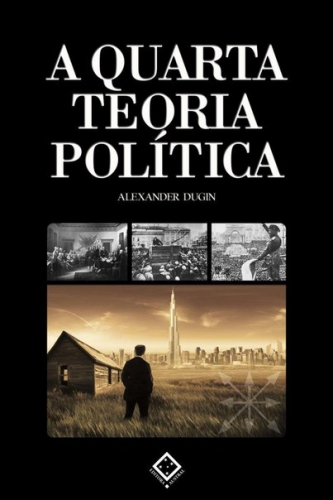 Mais qu’est-ce que la multipolarité ? Pour Alexandre Douguine, ce phénomène « procède d’un constat : l’inégalité fondamentale entre les États-nations dans le monde moderne, que chacun peut observer empiriquement. En outre, structurellement, cette inégalité est telle que les puissances de deuxième ou de troisième rang ne sont pas en mesure de défendre leur souveraineté face à un défi de la puissance hégémonique, quelle que soit l’alliance de circonstance que l’on envisage. Ce qui signifie que cette souveraineté est aujourd’hui une fiction juridique (pp. 8 – 9) ». « La multipolarité sous-tend seulement l’affirmation que, dans le processus actuel de mondialisation, le centre incontesté, le noyau du monde moderne (les États-Unis, l’Europe et plus largement le monde occidental) est confronté à de nouveaux concurrents, certains pouvant être prospères voire émerger comme puissances régionales et blocs de pouvoir. On pourrait définir ces derniers comme des “ puissances de second rang ”. En comparant les potentiels respectifs des États-Unis et de l’Europe, d’une part, et ceux des nouvelles puissances montantes (la Chine, l’Inde, la Russie, l’Amérique latine, etc.), d’autre part, de plus en plus nombreux sont ceux qui sont convaincus que la supériorité traditionnelle de l’Occident est toute relative, et qu’il y a lieu de s’interroger sur la logique des processus qui déterminent l’architecture globale des forces à l’échelle planétaire – politique, économie, énergie, démographie, culture, etc. (p. 5) ». Elle « implique l’existence de centres de prise de décision à un niveau relativement élevé (sans toutefois en arriver au cas extrême d’un centre unique, comme c’est aujourd’hui le cas dans les conditions du monde unipolaire). Le système multipolaire postule également la préservation et le renforcement des particularités culturelles de chaque civilisation, ces dernières ne devant pas se dissoudre dans une multiplicité cosmopolite unique (p. 17) ». Le philosophe russe s’inspire de certaines thèses de l’universitaire réaliste étatsunien, Samuel Huntington. Tout en déplorant les visées atlantistes et occidentalistes, l’eurasiste russe salue l’« intuition de Huntington qui, en passant des États-nations aux civilisations, induit un changement qualitatif dans la définition de l’identité des acteurs du nouvel ordre mondial (p. 96) ».
Mais qu’est-ce que la multipolarité ? Pour Alexandre Douguine, ce phénomène « procède d’un constat : l’inégalité fondamentale entre les États-nations dans le monde moderne, que chacun peut observer empiriquement. En outre, structurellement, cette inégalité est telle que les puissances de deuxième ou de troisième rang ne sont pas en mesure de défendre leur souveraineté face à un défi de la puissance hégémonique, quelle que soit l’alliance de circonstance que l’on envisage. Ce qui signifie que cette souveraineté est aujourd’hui une fiction juridique (pp. 8 – 9) ». « La multipolarité sous-tend seulement l’affirmation que, dans le processus actuel de mondialisation, le centre incontesté, le noyau du monde moderne (les États-Unis, l’Europe et plus largement le monde occidental) est confronté à de nouveaux concurrents, certains pouvant être prospères voire émerger comme puissances régionales et blocs de pouvoir. On pourrait définir ces derniers comme des “ puissances de second rang ”. En comparant les potentiels respectifs des États-Unis et de l’Europe, d’une part, et ceux des nouvelles puissances montantes (la Chine, l’Inde, la Russie, l’Amérique latine, etc.), d’autre part, de plus en plus nombreux sont ceux qui sont convaincus que la supériorité traditionnelle de l’Occident est toute relative, et qu’il y a lieu de s’interroger sur la logique des processus qui déterminent l’architecture globale des forces à l’échelle planétaire – politique, économie, énergie, démographie, culture, etc. (p. 5) ». Elle « implique l’existence de centres de prise de décision à un niveau relativement élevé (sans toutefois en arriver au cas extrême d’un centre unique, comme c’est aujourd’hui le cas dans les conditions du monde unipolaire). Le système multipolaire postule également la préservation et le renforcement des particularités culturelles de chaque civilisation, ces dernières ne devant pas se dissoudre dans une multiplicité cosmopolite unique (p. 17) ». Le philosophe russe s’inspire de certaines thèses de l’universitaire réaliste étatsunien, Samuel Huntington. Tout en déplorant les visées atlantistes et occidentalistes, l’eurasiste russe salue l’« intuition de Huntington qui, en passant des États-nations aux civilisations, induit un changement qualitatif dans la définition de l’identité des acteurs du nouvel ordre mondial (p. 96) ».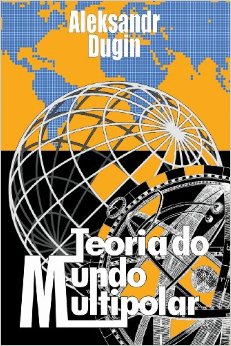 Piochant dans toutes les écoles théoriques existantes, le choix multipolaire de Douguine n’est au fond que l’application à un domaine particulier – la géopolitique – de ce qu’il nomme la « Quatrième théorie politique ». Titre d’un ouvrage essentiel, cette nouvelle pensée politique prend acte de la victoire de la première théorie politique, le libéralisme, sur la deuxième, le communisme, et la troisième, le fascisme au sens très large, y compris le national-socialisme.
Piochant dans toutes les écoles théoriques existantes, le choix multipolaire de Douguine n’est au fond que l’application à un domaine particulier – la géopolitique – de ce qu’il nomme la « Quatrième théorie politique ». Titre d’un ouvrage essentiel, cette nouvelle pensée politique prend acte de la victoire de la première théorie politique, le libéralisme, sur la deuxième, le communisme, et la troisième, le fascisme au sens très large, y compris le national-socialisme.



